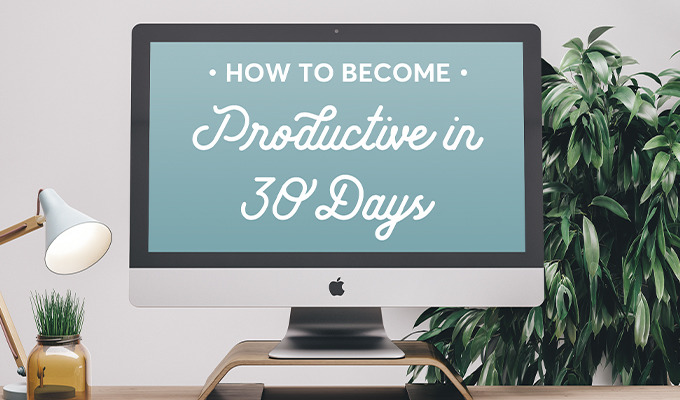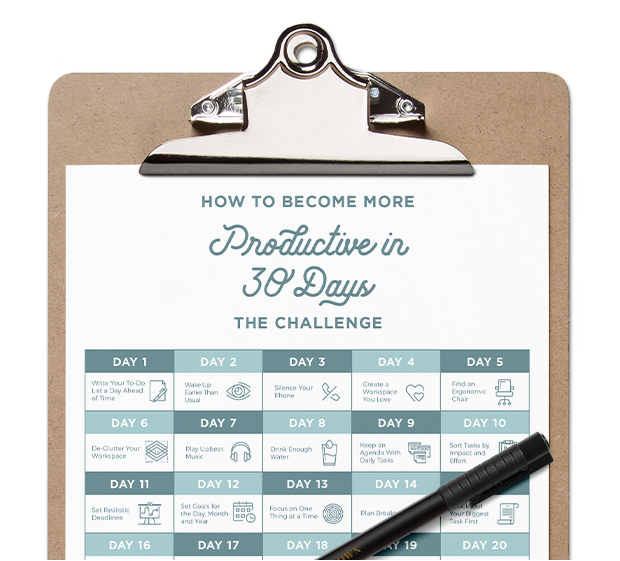How to Become More Productive in 30 Days: The Challenge

Whatever you're working on, being productive is the key to reaching your goals. But productivity doesn't just happen - it comes from the habits you develop and the choices you make every day. Here's a guide to developing a productivity practice that can help you feel better and accomplish more in just 30 days. Focus on doing one thing each day for the challenge - but make them all habits that become part of your daily routine.
Day 1: Write Your To-Do List a Day Ahead of Time
Day 1: Write Your To-Do List a Day Ahead of Time
Productivity depends on planning. Though it's tempting to write a to-do list of daily tasks first thing in the morning, you'll get through that list more efficiently if you write it up a day ahead. That gives you time to mentally prepare for each task and waste less time getting it done.
Day 2: Wake Up Earlier Than Usual
Waking early is a habit shared by many of the world's most successful people - and with good reason. Getting up early adds time to get some of the day's most important tasks out of the way and allows you to start working while your mind is alert and refreshed. Those early hours can also be used for exercise, meditation or other healthy things that can often be forgotten in the press of a busy day.
Day 3: Silence Your Phone
Ringing phones and text notifications interrupt concentration and can distract you from the task at hand. When you're working through your to-do list, turn off your phone or set it to silent. Add a time to your schedule for returning calls and messages, and stick to it unless there's an emergency.
Day 4: Create a Workspace You Love
Research on productivity reveals that people are more energized and productive when they're working in a space filled with colors and things that make them feel good. Whether you share an office with others, or you're carving out a workspace in the corner of your bedroom, take time to add good lighting, fill a wall with prints or posters, or arrange your desk just the way you like it.
Day 5: Find an Ergonomic Chair
Many people spend most of their workday sitting - but sitting in an uncomfortable chair can affect both your concentration and your health. Finding an ergonomic chair that's the right height and supports your back and legs can reduce physical distraction, improve your mood and enhance your productivity.
Day 6: De-Clutter Your Workspace
Some studies on productivity suggest that a cluttered work area actually increases stress, hinders concentration and drains your energy. When your desk is a mess, it's harder to find things you need and the overall look is hardly professional. Take a few minutes to tidy up and clear your workspace at the end of the day, or before you start work in the morning, for an easy way to boost productivity.
Day 7: Play Upbeat Music
The relationship of music to productivity has been the subject of intense study, but research suggests that playing upbeat music, rather than soothing, slow tunes, can boost energy and stimulate alertness. In some studies, people worked faster when listening to fast music with a driving beat. This kind of music can also make people happier and more willing to engage with others, so adding an upbeat playlist to your workday can be a simple and fun way to encourage productivity.
Day 8: Drink Enough Water
Dehydration can impair energy and concentration. Drinking enough water - or other fluids - can help improve your focus and keep your body functioning well. Swig cold water or iced tea for an instant wake-up if you're feeling sluggish at your desk.
Day 9: Keep an Agenda With Daily Tasks
It takes more than a daily to-do list to keep track of all the things you need to accomplish, and it's easy to miss less Important tasks. Keeping an agenda that's inspired by your big goals lets you schedule in all the jobs that need to get done, and reminds you why they should be done to further your long-term plans.
Day 10: Sort Tasks by Impact and Effort
If you're faced with a lot of tasks to do, setting priorities is essential to getting things done. One way to do that is to sort tasks according to the impact they're likely to have on your goals, versus the effort it takes to get them done. A relatively minor job could have a major effect - or vice versa. Organizing your tasks in this way can save time and avoid spending energy on things that don't yield much return.
30 Day Productivity Challenge

Are you up for it?
Jumpstart your days with this productivity challenge!
Day 11: Set Realistic Deadlines
Deadlines can be intimidating, but they provide a framework for getting things done. Establish deadlines that are realistic and manageable, given the task at hand and the time available. Build in some flexibility for dealing with unexpected problems that could slow you down.
Day 12: Set Goals for the Day, Month and Year
Goals become more achievable when they're broken down into manageable steps. Decide on your big goals for the year, and then set the smaller daily and monthly goals that will lead to completing the yearly plan. Add these goals to your agendas and to-do lists to keep them in mind.
Day 13: Focus on One Thing at a Time
Though it may seem that multitasking saves time and gets more done, productivity studies reveal that just the opposite is true. The human brain is organized to focus on one thing at a time, so dealing with multiple tasks and processing input from many sources at the same time reduces efficiency and limits your ability to retain information. What's more, some research suggests that habitual multitasking may actually reduce your IQ.
Day 14: Plan Breaks
The traditional "nose to the grindstone" approach leads to burnout and can harm your health. Build short breaks into your workday to stretch, take a short walk, drink some water or even exercise for 10 minutes or so. You'll return to your task refreshed and ready to concentrate.
Day 15: Knock Out Your Biggest Task First
Prioritizing can be a challenge if you have a lot of jobs to do, but putting your biggest task at the top of your to-do list and getting it done clears space for other things. It also gives a feeling of accomplishment that sets the tone for the whole day.
Day 16: Set High Priority Tasks During Your "Peak Hours"
Everyone has a period when they're working at their peak - alert, energized and focused. Whether your "peak hours" are early in the morning, late at night or somewhere in between, use those hours to take care of the most important tasks on your agenda.
Day 17: Work On Delegating Tasks
If you're feeling overwhelmed with too many things to do, consider which tasks, at work or at home, you can delegate to someone else. Make a list of all the jobs that need to be done in a day and decide which ones can be done by a family member or other helper.
Day 18: Work In Intervals and Time Yourself
For many people, working in timed intervals rather than long stretches is a way to improve efficiency and concentration. Set timers or alerts to help pace tasks and remind you to take a break to move around and re-focus.
Day 19: Outsource
Along with delegating tasks to others, outsourcing work related jobs to professionals in those areas can save you time and money. Even getting help for household chores can free your time for doing the tasks that only you can do. If there's anything someone can do better than you can, send that task their way - whether it's taking care of your accounting or cleaning the garage.
Day 20: Designate a Time for Answering Emails
Constantly checking and answering email can consume a lot of productive work time. Turn off email notifications while you're working and schedule a specific time in your workday to answer the ones that are important.
Day 21: Unsubscribe From Distracting Emails
Along with important emails, your inbox may be filled with a variety of distracting notices from lists you've subscribed to. Clean up your email by unsubscribing from any emails that aren't relevant to your goals and interests, or send them to a separate folder to read later.
Day 22: Look for Tools to Improve Your Workflow
If certain areas of your workflow aren't moving as smoothly as you'd like, look for new tools to help. From messaging and meeting apps to schedulers, planners and productivity software, new business tools can save you time and support your long-term goals.
Day 23: Minimize Meeting Time
Meetings may be necessary, but if they're not managed well, they can consume too much productive time. Consider "standing meetings" in which no one sits down, or virtual check-ins and chats with an in-office messaging and team management app.
Day 24: Learn to Say No
Along with delegating and outsourcing tasks to others, learn to say no when you need to. Taking on too many tasks and giving up too much of your time to meet others' needs creates stress and derails your own goals. Don't feel comfortable with saying no? Consider a course or book on setting boundaries to help you get the hang of it.
Day 25: Designate a Break for Social Media
Although social media can be both social and business related, checking your accounts throughout the day consumes work time and affects your concentration. Choose a time such as lunch or an afternoon break to catch up on social media and avoid distractions during work time. If you need help staying away from those distracting sites, consider tools like Leechblock or Nanny - browser extensions that allow you to block specific sites for certain periods of time.
Day 26: Use Your Commute Time
For many people, commuting is a regular part of the workday, and that time can be used for minor work tasks such as checking and answering emails and phone calls, or catching up on reading and research. Consider investing in devices and apps that can help you make your commute time more productive.
Day 27: Exercise Daily
Regular exercise has a long list of well-documented benefits for both the body and mind, and adding daily exercise to your routine can also boost productivity and counter the effects of long periods spent sitting. You don't have to put in long hours at the gym to see the benefits, either. Build exercise into your workday by stretching during breaks, taking a walk at lunch or after work, or using the stairs rather than the elevator.
Day 28: Make a Weekly List of Your Achievements
Seeing your accomplishments on paper can put things into perspective and keep you focused on your goals. Set a time at the end of every week to list your achievements, both large and small, for a boost in confidence and motivation.
Day 29: Reward Yourself
The brain is hard-wired with an extensive pleasure and reward network. Rewarding yourself for work well done, problems solved or goals met can reinforce positive feelings and keep you motivated and moving forward. Make sure rewards are healthy and meaningful.
Day 30: Sleep at Least 8 Hours Every Night
Sleep allows the brain to process information, consolidate memories and refresh itself. Sleep deficits can affect productivity in many ways, causing problems with concentration, decision making and organizing tasks. Aim for eight hours a night to boost brainpower and productivity.
So there you are - 30 tips to become more productive in 30 days.
